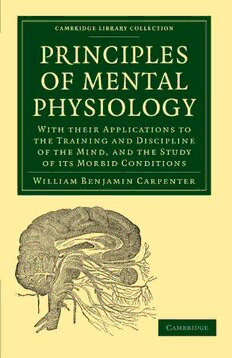
Principles of Mental Physiology: With their Applications to the Training and Discipline of the Mind, and the Study of its Morbid Conditions PDF
764 Pages·2009·12.773 MB·English
Most books are stored in the elastic cloud where traffic is expensive. For this reason, we have a limit on daily download.
Preview Principles of Mental Physiology: With their Applications to the Training and Discipline of the Mind, and the Study of its Morbid Conditions
Description:
William Carpenter (1813-85) was trained as a doctor; he was apprenticed to an eye surgeon, and later attended University College London and the University of Edinburgh, obtaining his M. D. in 1839. Rather than practising medicine, he became a teacher, specialising in neurology, and it was his work as a zoologist on marine invertebrates that brought him wide scientific recognition. His Principles of Mental Physiology, published in 1874, developed the ideas he had first expounded in the 1850s, and expounds the arguments for and against the two models of psychology then current - automatism, which assumed that the mind operates under the control of the physiology of the body for all human activity, and free will, 'an independent power, controlling and directing that activity.' Drawing on animal as well as human examples, his arguments, especially on the acquisition of mental traits in the individual, are much influenced by Darwin.
See more
The list of books you might like
Most books are stored in the elastic cloud where traffic is expensive. For this reason, we have a limit on daily download.
